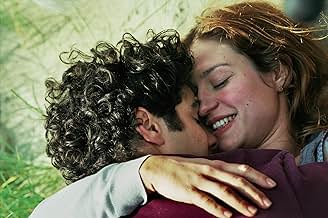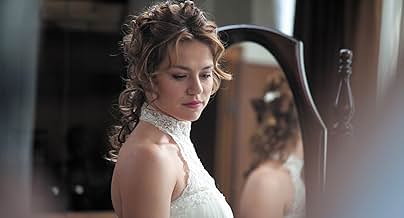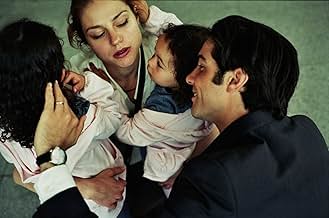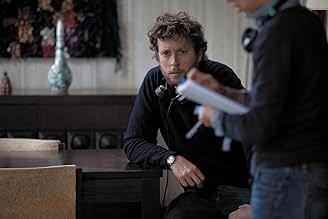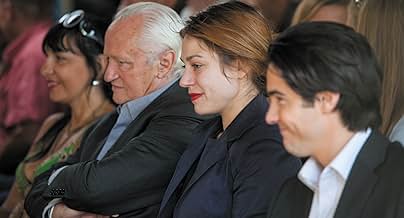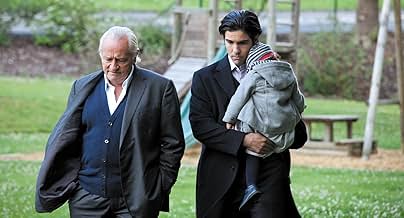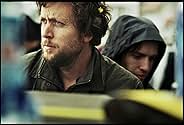IMDb रेटिंग
6.8/10
3.2 हज़ार
आपकी रेटिंग
अपनी भाषा में प्लॉट जोड़ेंHappy couple, will marry and have children under the roof of the benevolent Doctor. Little by little, relationships become complex, suffocating the couple and the family, who are unaware of ... सभी पढ़ेंHappy couple, will marry and have children under the roof of the benevolent Doctor. Little by little, relationships become complex, suffocating the couple and the family, who are unaware of the tragic end towards which they are headingHappy couple, will marry and have children under the roof of the benevolent Doctor. Little by little, relationships become complex, suffocating the couple and the family, who are unaware of the tragic end towards which they are heading
- निर्देशक
- लेखक
- स्टार
- पुरस्कार
- 9 जीत और कुल 12 नामांकन
फ़ीचर्ड समीक्षाएं
The film sets out its stall very early, so we know within the first few minutes what we are about to see, but I spent ninety minutes in denial, hoping against all expectation that something would happen to change the course of the story.
The male characters are predictable without being cartoonish, but the female parts are outstanding. The Moroccan grandmother exemplifies the way the grandfather has been able to develop a God complex, critical of North African patriarchy while practicing it himself. It is the children's mother (Emilie Dequenne), though, who gives the most extraordinary performance. She is utterly compelling and places us, however unwillingly, into the position of the oppressed and abused. I am rarely a fan of child actors but Jade and Sohane could have been in a fly-on-the-wall documentary, so natural did they appear.
The end had a sense of horrific inevitability handled with the sympathetic discretion of Elvira Madigan, with the soundtrack adding to that comparison.
Staggeringly heartfelt, disturbing and painfully real. Truly devastating.
The male characters are predictable without being cartoonish, but the female parts are outstanding. The Moroccan grandmother exemplifies the way the grandfather has been able to develop a God complex, critical of North African patriarchy while practicing it himself. It is the children's mother (Emilie Dequenne), though, who gives the most extraordinary performance. She is utterly compelling and places us, however unwillingly, into the position of the oppressed and abused. I am rarely a fan of child actors but Jade and Sohane could have been in a fly-on-the-wall documentary, so natural did they appear.
The end had a sense of horrific inevitability handled with the sympathetic discretion of Elvira Madigan, with the soundtrack adding to that comparison.
Staggeringly heartfelt, disturbing and painfully real. Truly devastating.
Depression is a terrible thing. The opening scene of 'My Children' tells us that an awful thing has happened, and the rest of the movie provides the background to the tragedy. It's a slow-paced film, and for much of its length, it feels too slow-paced for its own plot: it's not easy to see how the status quo is going to descend into tragedy within the allotted time. In the event, the end is sudden and not directly provoked: the cause is rather internal, the final snapping of its protagonist amid inner despair. Nonetheless, depression can be induced by real-world causes, and the film is actually, aside from its dramatic conclusion, an intriguing study of a subtly abusive relationship between an elderly doctor who in effect adopted a Moroccan family. In return for his generosity, he sought control, more control than any one person should have over the lives of others. Director Joachim Lafosse strangely shoots many scenes through out-of-focus doorways, a stylistic tic that I didn't quite understand; but this a powerful study nonetheless, a disturbing portrait of a family life that is superficially idyllic, but somehow not right nonetheless
I am not a professional reviewer nor a movie expert. I have been struck by this movie since I recognize a lot in my personal life. My wife suffers from a bipolar disorder, and it took us 10 years to understand what she has before we could start proper treatment. This movie shows in a subtle and nuanced way, without judging, the systemic and destructive effects of this dreadful illness.
I am fascinated by the way Joachim Lafosse, already at the age of 37, has been able to show the transformation of the relationship and behavior of the two other main characters, the partner and doctor. Many reviews suggest a perpetrator-victim relationship, for me Lafosse effectively showed that the whole family is a victim of this illness. In French "Tout comprendre c' est tout pardonner"; when you understand, you forgive. Very, very well done and the mother brilliantly played by Emilie Dequenne.
This is a must see for everybody who knows somebody with a mental illness.
I am fascinated by the way Joachim Lafosse, already at the age of 37, has been able to show the transformation of the relationship and behavior of the two other main characters, the partner and doctor. Many reviews suggest a perpetrator-victim relationship, for me Lafosse effectively showed that the whole family is a victim of this illness. In French "Tout comprendre c' est tout pardonner"; when you understand, you forgive. Very, very well done and the mother brilliantly played by Emilie Dequenne.
This is a must see for everybody who knows somebody with a mental illness.
A Perdre La Raison starts badly because within the first moments, Joachim Lafosse chose to reveal the final outcome: 4 little coffins, what's more white, one quickly can connect the dots which completely annihilates the element of surprise and ruins part of the interest of the movie, which anyway remains minimal.
Indeed, we're dealing with a superficial script, that raises a lot of questions but only offers a few answers which is very frustrating. One has trouble grasping the stakes and understanding the motivations because under the guise of suggesting, the movie never gets deeper on anything. The plot is very, very limited the dramatic resources are almost nonexistent and the lack of dialogues is as heavy as the atmosphere prevailing within this distinctive family, to say the least.
The character of André, quite intriguing and very well embodied by the ageless Niels Arestrup, is the only thing to remember.
Indeed, we're dealing with a superficial script, that raises a lot of questions but only offers a few answers which is very frustrating. One has trouble grasping the stakes and understanding the motivations because under the guise of suggesting, the movie never gets deeper on anything. The plot is very, very limited the dramatic resources are almost nonexistent and the lack of dialogues is as heavy as the atmosphere prevailing within this distinctive family, to say the least.
The character of André, quite intriguing and very well embodied by the ageless Niels Arestrup, is the only thing to remember.
A KVIFF screening, from French director Joachim Lafosse, before now the film has won a BEST ACTRESS award (for Émilie Dequenne) in UN CERTAIN REGARD competition in this year's Cannes.
It is an unsettling drama concerns a tragedy which would be quite a mind-shocker. The film begins with the wife lying in the hospital bed (clearly after some severe accident) and mumbling that her children should be buried in Morocco, so during the subsequent truth-revealing narrative, viewers are practically preparing ourselves to undertake a tremendous calamity (my speculation is a car accident), but the film will deliver a much stronger and crueler blow, the actual long-takes of the massacre are done in an eerily tranquil restraint (considerably withdrawn from the actual execution).
The foci are on the bizarre triangular relationship among three people, Mounir, a young Moroccan man and his French wife Murielle, live with elderly André a rich French doctor who had a paper marriage arrangement with Mounir's mother, so he could bring Mounir with him, and provide a job for him to work in his private clinic. So technically Mounir-André's quasi father- son bond has a deeper root (than Murielle, the clear intruder could imagine) although they are no blood linkage. Later, when their children consequently arriving in this world, step-by-step Murielle finds herself suffocated by the temporal life (possibly postpartum depression), and eagerly sways Mounir to go back to Morocco with their family, to start their life anew. But thing is slipping to an abyss when André cannot risk losing them and Mounir relies too much on him (both economically and psychologically) as well. Until the confrontation between Murielle and André finally occurs, the tragedy is inescapable.
A heavy string score is predestined to the solemn tenor, the film is a trifle long-haul (a 111 minute running time) and the transitions of the characters' mental activities are either too abrupt or too hackneyed, but Émilie Dequenne for sure has been splendidly extraordinary in her devastating role, her self-destroy interpretation is powerful enough to propel the story against its ill-fated destiny. The A PROPHET (2009, a 9/10) pair, Tahar Rahim and Niels Arestrup are sharing their leading status as the other two angles of the triangle hazard, and overtly the latter has a meatier presence.
There is a chafed undertone against the main plot, which I dare not to sidestep, the legality of paper marriage may not be the crux behind the tragedy, but nevertheless plays an influential part of the contemporary immigrant quandary.
It is an unsettling drama concerns a tragedy which would be quite a mind-shocker. The film begins with the wife lying in the hospital bed (clearly after some severe accident) and mumbling that her children should be buried in Morocco, so during the subsequent truth-revealing narrative, viewers are practically preparing ourselves to undertake a tremendous calamity (my speculation is a car accident), but the film will deliver a much stronger and crueler blow, the actual long-takes of the massacre are done in an eerily tranquil restraint (considerably withdrawn from the actual execution).
The foci are on the bizarre triangular relationship among three people, Mounir, a young Moroccan man and his French wife Murielle, live with elderly André a rich French doctor who had a paper marriage arrangement with Mounir's mother, so he could bring Mounir with him, and provide a job for him to work in his private clinic. So technically Mounir-André's quasi father- son bond has a deeper root (than Murielle, the clear intruder could imagine) although they are no blood linkage. Later, when their children consequently arriving in this world, step-by-step Murielle finds herself suffocated by the temporal life (possibly postpartum depression), and eagerly sways Mounir to go back to Morocco with their family, to start their life anew. But thing is slipping to an abyss when André cannot risk losing them and Mounir relies too much on him (both economically and psychologically) as well. Until the confrontation between Murielle and André finally occurs, the tragedy is inescapable.
A heavy string score is predestined to the solemn tenor, the film is a trifle long-haul (a 111 minute running time) and the transitions of the characters' mental activities are either too abrupt or too hackneyed, but Émilie Dequenne for sure has been splendidly extraordinary in her devastating role, her self-destroy interpretation is powerful enough to propel the story against its ill-fated destiny. The A PROPHET (2009, a 9/10) pair, Tahar Rahim and Niels Arestrup are sharing their leading status as the other two angles of the triangle hazard, and overtly the latter has a meatier presence.
There is a chafed undertone against the main plot, which I dare not to sidestep, the legality of paper marriage may not be the crux behind the tragedy, but nevertheless plays an influential part of the contemporary immigrant quandary.
क्या आपको पता है
- ट्रिवियाThe official entry of Belgium to the Best Foreign Language Film at the 85th Academy Awards 2013.
टॉप पसंद
रेटिंग देने के लिए साइन-इन करें और वैयक्तिकृत सुझावों के लिए वॉचलिस्ट करें
- How long is Our Children?Alexa द्वारा संचालित
विवरण
- रिलीज़ की तारीख़
- कंट्री ऑफ़ ओरिजिन
- आधिकारिक साइटें
- भाषाएं
- इस रूप में भी जाना जाता है
- Perder la razón
- फ़िल्माने की जगहें
- Dudelange, लक्समबर्ग(town hall for the wedding ceremony)
- उत्पादन कंपनियां
- IMDbPro पर और कंपनी क्रेडिट देखें
बॉक्स ऑफ़िस
- US और कनाडा में सकल
- $23,203
- US और कनाडा में पहले सप्ताह में कुल कमाई
- $5,500
- 4 अग॰ 2013
- दुनिया भर में सकल
- $7,00,215
- चलने की अवधि1 घंटा 51 मिनट
- रंग
- ध्वनि मिश्रण
- पक्ष अनुपात
- 2.35 : 1
इस पेज में योगदान दें
किसी बदलाव का सुझाव दें या अनुपलब्ध कॉन्टेंट जोड़ें




